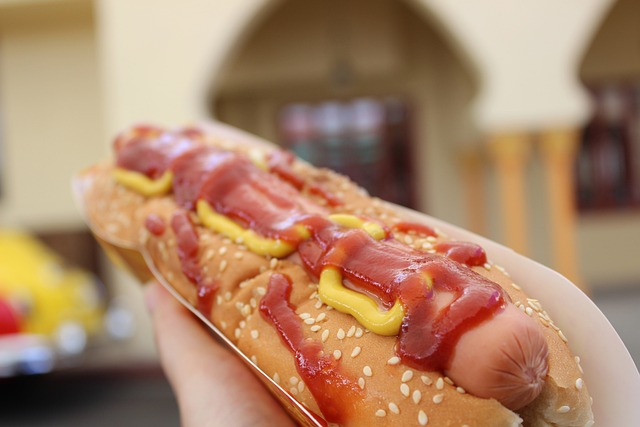
A meal of choice at any barbeque or sporting event, hot dogs are extremely popular amongst humans. Since we like them so much, pet owners often wonder, can dogs eat hot dogs? When it comes to your pup, it’s crucial to consider their health and safety before sharing some of our favourite snacks with them, and so you’ll want to know what kind of risks are associated with feeding hot dogs to your furry friend. Thus, while dogs can technically eat hot dogs, it is not recommended, and there are several important health factors to consider before offering them to your dog.
Table of Contents
Why Can’t Dogs Eat Hot Dogs?
Hot dogs are highly processed and usually contain a mix of different meats, seasonings, preservatives, and other additives that are not good for dogs. Some hot dogs may even contain seasonings that are toxic to dogs, like onion powder or garlic powder. Moreover, they are also high in salt, which is bad for dogs, especially if consumed in large amounts. Eating too much of foods that are high in sodium can lead to possible dehydration or other health issues. Similarly, foods high in fats, like hot dogs, can contribute to obesity and related health problems. Here are some other health concerns to consider:
- Choking Hazard: Hot dogs’ shape and size can be a choking hazard, especially for small dogs or dogs that like to gulp their food down without chewing properly.
- Digestive Issues: Hot dogs can lead to gastrointestinal upset, like vomiting and diarrhea. In some cases, it can also trigger pancreatitis, a serious condition that requires immediate veterinary attention.
- Toxic Ingredients: Some hot dogs may include onion and garlic powder, which are toxic to dogs and can lead to severe health complications if ingested in large amounts.
- Preservatives: Many hot dogs contain additives and preservatives, such as sodium nitrate, which can be harmful to dogs and could potentially lead to a higher risk of various diseases.
How Many Hot Dogs Can Dogs Eat?
Ideally, a dog should not eat hot dogs at all. Given these aforementioned considerations, if you decide to give your dog a hot dog, it should only be in very small amounts and very infrequently. Ensure the hot dog is plain, without any condiments, like ketchup and mustard, or spices. Be sure to cut it into small pieces to reduce the risk of choking. Choose low-sodium, low-fat varieties without harmful additives or toxic seasonings like garlic or onion. Always consult your vet before feeding your dog a new food, especially something that is not meant for canine-diets like hot dogs.
Healthier Alternatives
If you’re looking for treat options for your dog, consider healthier and safer alternatives that provide nutritional benefits without the risks associated with processed foods like hot dogs. Some good options include:
- Cooked, Lean Meats: Unseasoned chicken, turkey, or beef, that is fully cooked without added oils or spices, could be a healthier choice and better protein sources for dogs. Be sure to cut them into bite-sized pieces and consult a vet before introducing any new food, including meat, into your dog’s diet.
- Vegetables and Fruits: There are a plethora of fruits and veggies that many dogs can enjoy. These provide more vitamins and fiber with minimal calories and are much less risky than a hot dog. Check with your vet to see what ones your dog can try in moderation.
- Commercial Dog Treats: There are many high-quality, nutritious dog treats available that are specifically formulated to be safe and healthy for dogs.

What If a Dog Eats a Hot Dog?
While dogs may seem excited to try a bite of hot dog, it is important to prioritize their overall health and safety by being cautious and considering the potential risks associated with processed foods. If your dog does eat a hot dog by accident, keep an eye on them and monitor them for any signs of an upset stomach, general discomfort or health issues. If your dog consumed a large amount of hot dogs, or you noticed persisting adverse reactions, consult your veterinarian immediately for professional advice.
Offering healthier alternatives and keeping hot dogs as a very rare and minimal treat, if at all, can help ensure your dog maintains a balanced diet and a healthy lifestyle. Always consult a vet before introducing any new kinds of food into your dog’s diet.
FAQ
Can Dogs Eat Hot Dog Buns?
It is not generally recommended for dogs to eat hot dog buns because they do not technically offer them any kind of nutritional benefit. Moreover, if your dog has a grain or gluten allergy, them eating a bun can be much more problematic and cause health issues or a reaction. Always monitor your pet for any adverse reactions and contact your vet with any concerns.
Can Dogs Eat Hot Dogs Raw?
It is not a good idea to feed your dog hot dogs raw. Not only because of the problematic aspects of hot dogs discussed above, but because raw hot dogs can contain harmful bacteria such as listeria and salmonella, which can cause illness in both dogs and humans. For the well-being of your pet, it’s best to avoid feeding them raw hot dogs and to always ensure meat is cooked thoroughly. In general, it is a better idea to instead opt for healthier, safer snack options designed specifically for canine dietary needs and not hot dogs.
What Types of Hot Dogs Can Dogs Eat?
Most, if not all, hot dogs are bad for dogs because of their processed nature and because of the added seasonings and ingredients that can be harmful and even toxic. Hot dogs often contain too much salt then is healthy for a dog, and the high fat content makes them rough on a dog’s digestive system and bad for their overall health. Avoid any hot dog with added nitrites or nitrates, and especially avoid any with onion or garlic, as those are toxic. Try to choose a safer and healthier treat for your dog instead of hot dogs, as the risks associated with feeding them to your pet are not worth it.
Can Dogs Eat Corn Dogs?
Feeding corn dogs to dogs is not recommended due to several health concerns. The batter used for corn dogs adds extra calories and carbohydrates, which can contribute to weight gain and obesity in dogs. Additionally, the deep-frying process adds unhealthy fats, which increases the risk of pancreatitis or other digestive issues. The stick inside a corn dog can also be a choking hazard or cause injury if ingested. For your dog’s health and safety, it’s best to avoid giving them corn dogs and opt for healthier, dog-friendly treat options.
Can Dogs Eat Hot Dog Condiments?
Common toppings used on hot dogs include popular condiments like ketchup and mustard, which may be fun for human’s to dress up their meal, but what about for pets? It is safest to leave the condiments out of your dog’s diet, and do not feed them ketchup because of its high sugar content, processed nature, and the possible presence of toxic additives. Moreover, it is also especially important to not feed your dog mustard, as it is toxic for dogs and can cause serious harm. Therefore, it is best to avoid feeding your dog all hot dog related foods including the meat itself, the bun, and especially the toppings.
Interested to find out more about what dogs can eat? Check out these related articles


